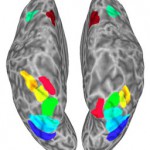Tag Psychology
Brain pathways tie together mental maps
To find its way in the world, your brain has to decipher a set of directions muddled by different points of view.
Language can reveal the invisible, study shows
It is natural to imagine that the sense of sight takes in the world as it is - simply passing on what the eyes collect from light reflected by the objects around us.
Hormones may usher abused girls into early adulthood
During the sort of tense situation that makes palms sweat and voices quaver, children and young adults are typically awash in cortisol, a stress hormone that sounds an alarm and prepares the body for fight-or-flight responses to danger.
Passionate, student-focused psychology instructor Hendricks dies
Bryan Hendricks, who became a student favorite during 12 years as an instructor in the University of Wisconsin–Madison Psychology Department, died Friday morning at age 66 following an illness that had recently forced his retirement.
Psychology prof studies what’s behind candidates’ smiles
As she was watching the first presidential debate, psychology Professor Paula Niedenthal couldn't help but notice something odd about Barack Obama's smile.
Pacifiers may have emotional consequences for boys
Pacifiers may stunt the emotional development of baby boys by robbing them of the opportunity to try on facial expressions during infancy.
Stress breaks loops that hold short-term memory together
Stress has long been pegged as the enemy of attention, disrupting focus and doing substantial damage to working memory - the short-term juggling of information that allows us to do all the little things that make us productive.
Study pinpoints Ritalin’s influence
Millions of individuals diagnosed with attention deficit hyperactivity disorder (ADHD) are helped by methylphenidate, the stimulant better known as Ritalin. Now researchers at the University of Wisconsin–Madison have pinpointed the area of the brain in which Ritalin does its work.
Psychologist to explain 3-D perception to National Geographic audience
Bas Rokers, an assistant professor of psychology at the University of Wisconsin–Madison, will illustrate how our brains process visual motion and depth during the three-part National Geographic television series "Brain Games."
Study: Advantages of single-sex schooling a myth
As Madison deals with a proposal to establish a single-sex charter school, a University of Wisconsin–Madison professor of psychology is one author of an article that calls the scientific case for single-sex schools "pseudoscience."
Forum considers human consciousness
The 10th annual International Bioethics Forum, Manifesting the Mind, will explore perspectives on human consciousness at its two-day symposium April 28-29.
Noted primate researcher to discuss animal research
On Tuesday, March 29, University of Wisconsin–Madison psychology professor Charles Snowdon will discuss his decades of research on a small new-world monkey called the cotton-top tamarin.
New perspective diminishes racial bias in pain treatment
Years of research show black patients getting less treatment in the American health care system than their white counterparts, but a new study suggests that a quick dose of empathy helps close racial gaps in pain treatment.
Banking on predictability, the mind increases efficiency
Like musical compression saves space on your mp3 player, the human brain has ways of recoding sounds to save precious processing power.
Peace of mind closes health gap for less educated
Psychological well-being is powerful enough to counteract the pull of socioeconomic status on the long-term health of the disadvantaged, according to a study by researchers at the University of Wisconsin–Madison.
Large study shows females are equal to males in math skills
The mathematical skills of boys and girls, as well as men and women, are substantially equal, according to a new examination of existing studies in the current online edition of journal Psychological Bulletin.
For first time, monkeys recognize themselves in the mirror, indicating self-awareness
Typically, monkeys don't know what to make of a mirror. They may ignore it or interpret their reflection as another, invading monkey, but they don't recognize the reflection as their own image. Chimpanzees and people pass this "mark" test - they obviously recognize their own reflection and make funny faces, look at a temporary mark that the scientists have placed on their face or wonder how they got so old and grey.
Monkey generosity: No strings attached
Among monkeys that split child care responsibilities, sharing extends to dinnertime, but grudges do not, according to research published July 14 in Proceedings of the Royal Society B.




